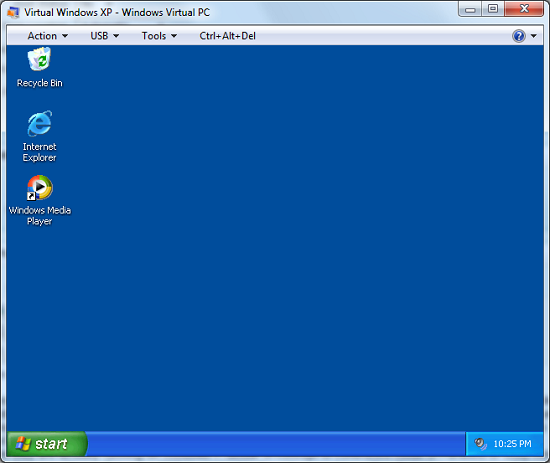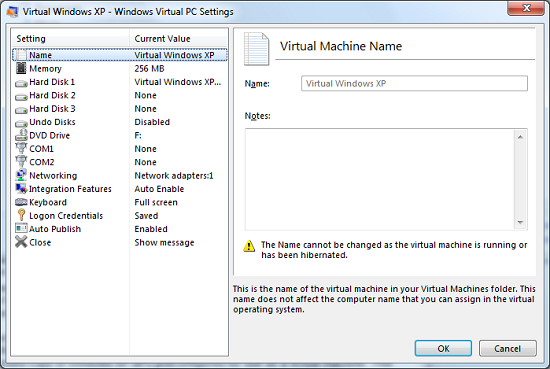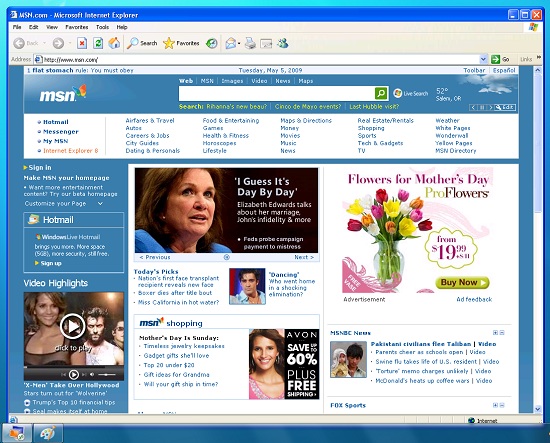Windows 7: Release Candidate 1 Preview
by Ryan Smith and Gary Key on May 5, 2009 11:00 PM EST- Posted in
- Systems
Virtual Windows XP
As we mentioned previously, Microsoft’s big secret unveiled with Windows 7 RC1 is Virtual Windows XP (VXP for short). One of the issues Microsoft has been having in bringing business users over from Win2K and XP to Vista and beyond has been that Windows does not have perfect backwards compatibility. With consumer applications this is not such a big deal since most of those are wide-audience products that get updated regularly, but this is not always the case for business software. Whether it’s some custom in-house application that no one can fix, or a 3rd party application that just works and can’t be updated, business users sometimes can’t escape the fact that they need to be able to run old applications that don’t work in newer operating systems.
VXP is in essence the bone Microsoft is throwing to business users to allow them to run those old applications while using Windows 7. VXP leverages Microsoft’s existing Virtual PC virtualization software that they acquired several years back, by bundling it with a fully licensed copy of Windows XP SP3 preconfigured for use as a virtual machine. This virtual machine can then be partially integrated in Windows 7 so that applications operating inside of it look and behave like they are actually running on Windows XP, similar in concept to the coherence mode of Parallels or Unity mode of VMware. In this case Microsoft is using RDP to connect to the virtual machine rather than screen scraping the entire desktop like Parallels and VMware do. Microsoft does the same thing for the Windows Home Server Console.

VXP Desktop View
As Virtual PC was already free, the significance of this announcement is not the technical details, but rather that Microsoft is endorsing it as an official solution to backwards compatibility problems. It’s long been expected that Microsoft would do something with Virtual PC as a backwards compatibility solution and this is finally it, albeit in a limited role.
Because of the system requirements and issues raised by relying on a virtual machine of XP, VXP is a last-ditch compatibility solution rather than any kind of primary solution. On the system requirement side, VXP requires a processor with hardware virtualization features, along with at least 256MB of RAM and the disk space needed to run the virtual machine. It’s not too bad for a modern system, but it does rule out an older system that may be suitable for upgrading to Windows 7, but not running VXP on top of that.

VXP Configuration
As for the issues raised by using VXP, first and foremost it’s a complete copy of WinXP, with all of its security deficiencies and bugs. It needs security software, it needs administration, and it needs security updates. This also brings up a matter that Microsoft hasn’t answered yet: what happens when WinXP support ends in 2014? Windows 7 will have support until at least 2020, which means either Microsoft is going to drop support for this component of Windows 7 early (an unprecedented move) or they have to extend XP support to match Windows 7’s support cycle. We’re still trying to get a final answer on this.
It should also be noted that VXP only comes with Professional edition and higher, as it’s not intended to be a consumer compatibility solution. And before anyone gets any ideas, it’s not suitable for playing games – the graphics hardware is the usual emulated S3 Trio 64, and the screen does not refresh nearly fast enough to keep up with any kind of action game. Solitaire may be playable, however.

VXP in integrated mode running IE6
At any rate, Virtual Windows XP is a good solution to some compatibility needs, so long as it’s recognized that it’s not the solution to all compatibility needs. For the handful of business users it’s designed for, we would expect that it does its intended job well. However for non-business users that absolutely must have a virtual machine (and won’t need support from Microsoft), it may be worthwhile to look into a free solution like VirtualBox.
Looking towards the future, there has been a lot of speculation that Microsoft may try to make a big break from the Windows APIs in order to clear out all the cruft and deprecated functions that litter their APIs. This isn’t happening today with Windows 7 and VXP, but integrating a virtual machine is the first stepping stone in making it happen. What Microsoft does after VXP is undoubtedly going to be a matter of great interest.










121 Comments
View All Comments
Bmadd - Wednesday, May 6, 2009 - link
I see the graphs, i see the new features and i honestly cant be the only person who doesn't want to change from my Vista x64 install? Can i? i got a dual core and 4gig of ram, a dash of tweaks and moving the pagefile and everything loads within a second of running. I personally dont see how going from vista to 7 for me can be a thought when there gonna give me the only thing i care for in 7 and thats DirectX11 and the new aero features. Thanks MSSazar - Wednesday, May 6, 2009 - link
Why not?It's free to use and try. If you don't like it, go back.
I have switched both my HTPC and my main rig to Windows 7 simply because it is a more efficient way for me to work. The homegroups sharing features is miles better than the old, archaic sharing method and the new Media Center interface is fantastic.
Also, Windows 7 loaded up all the drivers I needed by default, including both of my Hauppauge TV Tuner drivers and it just worked.
I see a lot of naysayers nit-picking, which is fine. However, I have yet to see anyone point out anything meaningful that should disuade people from either using Vista or Windows 7.
Btw, for me, the biggest selling feature, beyond the vastly improved 10 foot interface in MCE, was Aero Peak. Can't go back to Vista now without that functionality :)
Bmadd - Wednesday, May 6, 2009 - link
Well i have never really used gadgets, widgets and such. There not for me like myspace and twitter aren't for me. I would hate to change to win7 after setting me vista install up so nicely only to not like it and have to spend time getting it back to the sleak thing it is at the moment.Perhaps i will download the RC and just keep it there till Win7 is released and drivers are all sweet, install RC on a new hard drive and go from there but i am fair to pleased with my current vista install to consider changing
papapapapapapapababy - Wednesday, May 6, 2009 - link
not a single feature that i want or even care about. how about a good competent fast image viewer? more drm? giant icons? no classic ui? terrible. just give me a smaller, faster, stronger and more efficient xp or gtfo ms.TonkaTuff - Wednesday, May 6, 2009 - link
Microsoft should count themselves very lucky that Apple remains uninterested in being the OS for everyone and restrict themselves to the premium OS and hardware market.Yeah Snookie Im sure apple holds themseves back from over 90% of the O/S market based on there morals and lack of interest in making more money. What kind of deranged fanboy are you? Comments like the one above show how brainwashed some of you looney tunes are becoming.
It really is scary and you should seek professional help.
A comment in the article really hit the nail on the head,
MANY PEOPLE SAY THEY HATE VISTA BUT FEW CAN ACTUALLY SAY WHAT THEY HATE ABOUT IT.
Yeah Vista had issues when it first was released, it was a major step from the XP O/S but that was 2 bloody years ago. Ive been running Vista on my Gaming rig and my Work Laptop and a server/seed box and in 12 months I havnt had 1 crash that was the O/S's fault, Not one crash, not one BSOD, probably 4 or 5 freeze ups that had to be end tasked in 12 months on 3 systems numbering well over a 1000 hours of use, not even XP could claim to be that stable.
Like any O/S it has its annoyances, they all do (yes snookie even your precious mac).
Do I expect Win7 to be much different from Vista? No not really, I expect it will be a dressed up and refined version of Vista.
Why would Microshaft do such a thing, they just want more money, why not release it as a service pack for Vista?
BECAUSE THEY HAD TO CHANGE THE NAME AND MAKE IT OUT TO BE DIFFERENT FROM VISTA BACAUSE OF ALL THE LEMMINGS OUT THERE THAT HATE VISTA BUT DONT KNOW WHY THEY HATE IT!!!!!!!!!!!
End of rant.......Snookie you sir are a sychotic applemac fanboi, get help for god sake.
squeezee - Wednesday, May 6, 2009 - link
Microsoft has said to developers (at PDC at least) that Direct2D and DirectWrite along with the rest of DirectX 11 functionality will be available on windows Vista.fendell - Wednesday, May 6, 2009 - link
Has anyone tested Windows 7 and Ventrilo (any version) over some time?It's the only thing that keeps me on 64bit XP at the moment, because ventrilo has this weird behaviour on windows 7 where it suddenly doesnt recieve data for 2-5 minutes, then suddenly gets everything at once, this is veery frustrating and in fact raidbreaking in wow ;)
nycromes - Wednesday, May 6, 2009 - link
I have also used Windows 7 RC for WoW raiding and have had no major issues. Ensure you are running it as an administrator. I had a few issues before doing that, but none like you are describing. I am using a USB microphone and a standard soundcard speaker combination with no issue.vectorm12 - Wednesday, May 6, 2009 - link
I use ventrilo for wow a couple of times per week, at times for hours without any issues on build 7077x64(correct me if I'm wrong, found on piratebay.org btw). However I do use a USB connected wireless Microsoft headset(looks like the 360 one but grey) which might have some impact as it works like a second soundcard.snookie - Wednesday, May 6, 2009 - link
If you think XP is the best OS ever then you haven't used very many. It is archaic."The biggest news is that the Ultimate/Business/Home Premium schism has been resolved with Windows 7."
This is a pretty amazing statement seeing as how it took a further paragraph to partly but not fully describe what all the versions are for.
The Start Menu remains a horrible user interface designed by committee. Just awful.
Windows 7! Now with even more DRM!!!
UAC is an attempt to place responsibility for security too much on the user which is why it was so intrusive. A certain amount of user action is reasonable but UAC went far beyond that.
WTF, why does IE 8 take up so much space with its headers? Seriously Microsoft do you have no idea at all about usability? Slapping a ribbon interface on a simple text processor is just dumb.
Mail, Calendar, and Movie Maker might as well have been removed because they suck. But their removal points out even more how Microsoft needs its own version of iLife.
ISO implementation is so Microsoft. Half-ass as usual.
Why does Windows 7 need a disk defragmenter in 2009? No other modern OS does.
Virtual Windows XP? Is this a joke? Probably won't run on older machines which is where it is needed most and even more headaches for desktop admins for configuration and administration.
Why would you do performance testing on an SSD drive which very few desktop boxes have these days?
Looks like Windows 7 will suck on laptops as much as Vista does. Not good news since so many notebooks are sold these days.
My recommendation to Corporations is that for the 95% of users who need basic functionality they replace Windows entirely with a locked down Linux of some form. Many that I have worked with are considering this very thing and I have no doubt the Windows 7 will hasten this decision. XP requires far too intensive support ( yes i know your handbuilt game tower never has to be rebooted with XP, sure it doesn't).
Microsoft should count themselves very lucky that Apple remains uninterested in being the OS for everyone and restrict themselves to the premium OS and hardware market and that an unrestricted Linux desktop is still to complicated for most users. more and more companies are providing their high end IT Architects and Developers with Macs and they are happily snapping them up. I have seen this at Cisco, Oracle, Motorola, and may others. When Visual Studio using .NET developers would rather use a VM on OS X t do their development there is something very wrong and I'm seeing a lot of that.
The authors really do not understand the relationship between development tools, threads, the kernel, and processor usage.